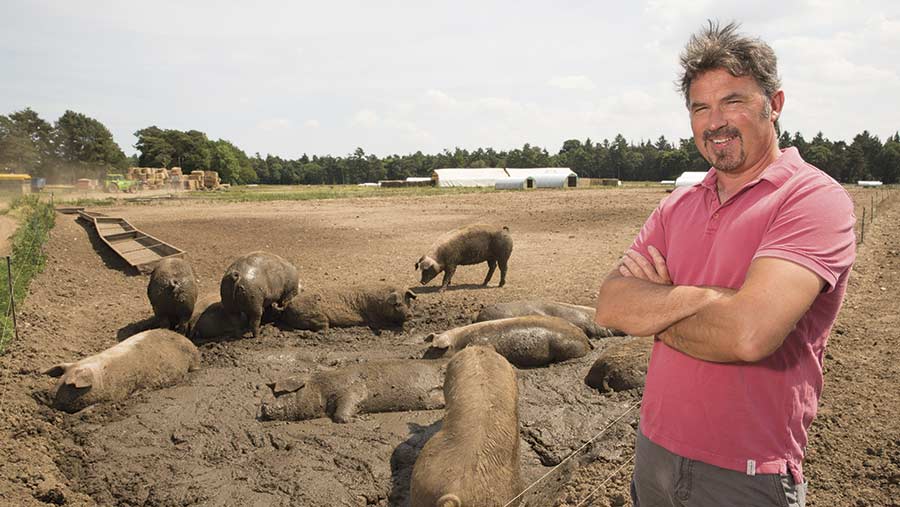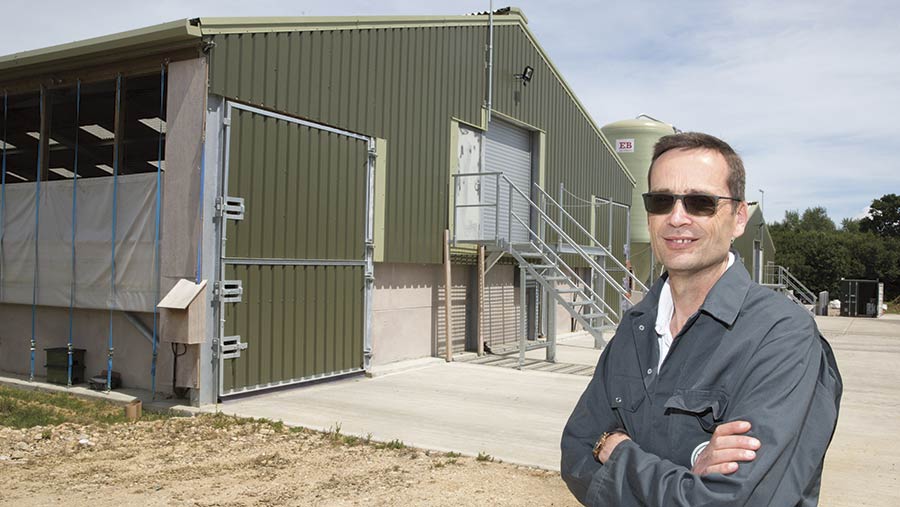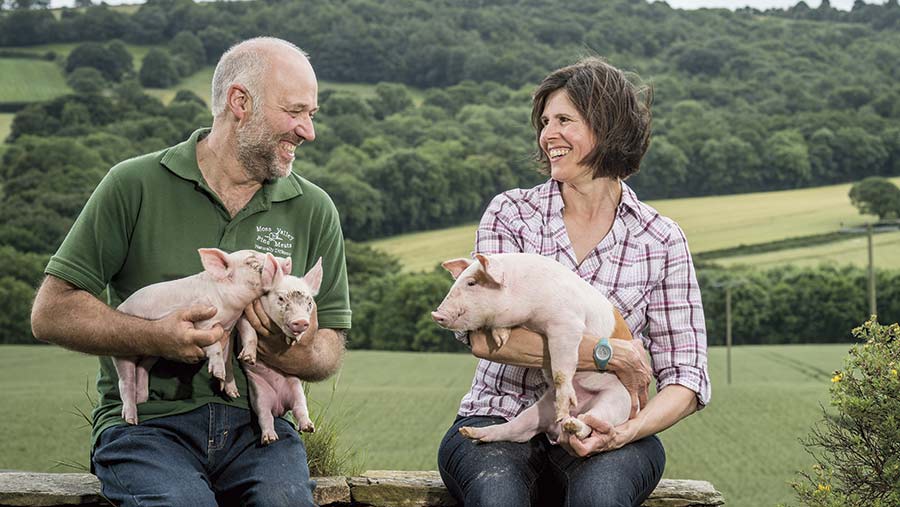2017 FW Awards: Pig Farmer of the Year finalists
The Farmers Weekly Awards 2017 finalists have been announced and the judges have visited each of the finalists for a three-hour interview and tour.
Top technical performance was the common theme across all three finalists this year, which ranged from the largest pig producer in the country to a family-run farrow-to finish farm marketing their own produce.
See also: View last year’s winners
The 2017 Pig Farmer of the Year finalists are:
- Guy King, GSK Pigs, Park House, North Elmham, Dereham, Norfolk
- Howard Revell, British Quality Pigs, Stradbroke, Suffolk
- Stephen and Karen Thompson, Moss Valley Fine Meats, Povey Farm, Sheffield, Yorkshire
The judges:
- Zoe Davies, independent judge
- Steve Hart, last year’s winner
- Sarah Alderton, freelance journalist
Guy King, GSK Pigs, Park House, North Elmham, Dereham, Norfolk

Guy King ©Tim Scrivener
Farm facts
- Contract breeder for BQP with 3,500 outdoor-breeding sows across four rented sites
- 19 staff
- Batch farrowing except for organic unit, which is weekly
- Breeds own replacements
- Looking at grassing some sites for environmental reasons
Just 10 years ago Guy King sold his house and beloved classic car to secure enough funds as a deposit for a loan so he could set up his own outdoor pig-breeding unit.
He rented 200ha of land on a nearby estate and via British Quality Pigs, took charge of 500 breeding sows.
Within two years he had increased sow numbers to 800 and had almost paid off the loan.
From then he has continued to build the business and now has almost 3,500 breeding sows across four units, one of which is organic and one of the largest herds in the country. He also employees 19 people.
Business
All the sows are owned by BQP and piglets at weaning are moved to dedicated BQP finishers.
Guy owns the equipment, housing, straw and provides the labour, feed and vet and medicines. He is paid a management fee for every piglet produced.
Staff are very important to the business, with each unit employing a senior manager. Routines are consistent across each site.
A bonus scheme is also in place for when targets are exceeded for pigs sold per batch.
Guy is keen on bringing new talent into the industry and has employed five apprentices to date, with a new apprentice starting in the next few weeks.
He has recently gone into partnership with one of his long-standing employees, Dave, and has set up the fourth unit, which has 850 sows.
“Dave manages this unit and as a part-owner he has his own investment in the business. I think this could be a model for future employees and could help with staff retention and also succession in the future,” Guy says.
Technical
By being a contract breeder for BQP, all the technical aspects such as feeding regimes, genetics, health and welfare protocols are set out by BQP.
The organic herd is one of the newest sites to be taken on and has undergone a depop-repop over the past six months to help improve the health status of the pigs.
Guy is keen to secure a finishing site, as he believes this will make things easier to manage. He is also planning on grassing the outdoor paddocks for environmental reasons.
EID in sows is being trialled on one of the units, which is hoped to make record keeping easier and reduce paperwork.
The judges liked
- Willing to take risks
- Has excellent production figures for an outdoor herd
- Looking to grow the business
- Staff management-training, bonus scheme, open to going into partnership with them
- Identified new opportunities
- Use of technology – trialling EID on sows on one unit
Howard Revell, British Quality Pigs, Stradbroke, Suffolk

Howard Revell ©Tim Scrivener
Farm facts
- Founded 37 years ago
- Owned by Dalehead Foods, which is a subsidiary of Tulip
- Main customer is Waitrose
- 40,000 outdoor sows (10% of UK sow herd) with 300,000 growing pig places, mostly indoor straw-based systems, with some finished free-range and organic.
Established 37 years ago, British Quality Pigs has moved from a business that was once a side-line for the original owners, Bibby’s Feed, to a company that makes up 10% of the UK sow herd.
They are producing well over a million pigs a year, predominately for their main customer, Waitrose.
Their objective is to produce pigs in an ethical, responsible and efficient way while keeping high welfare and customer needs at the core.
Business
BQP employs about 45 people, with a dedicated team of field staff who provide training and support to their farmers.
There is also a team of vets and a technical team, who run trials on the firm’s own farm in Suffolk. Howard Revell, who has been with the company for 30 years, manages the various technical teams as well as the customer-facing supply chain teams.
All the sows are owned by BQP. Breeding farmers are paid a management fee for every piglet produced. Pigs are contract finished on dedicated finisher farms, indoor on straw. They also have a dedicated supply group of farms producing free-range pigs.
Technical
The company has a multiplication farm producing breeding gilts. Genetics are focused on efficiency, carcass traits and eating quality. Research done at the trial farm has helped inform decisions about genetics, as well as other technical areas of the business.
Although all the pigs are managed by contract farmers, BQP has a firm handle on technical performance on each of the farms. Agrosoft is used to analyse performance figures, along with Win-Pig on the breeding farms.
Keeping track of key performance indicators on individual farms allows the BQP field team to highlight any farms not meeting targets and help get to the bottom of any issues.
Over the past few years, BQP has been working with its farmers to help reduce antibiotics use, with a target to cease use of critically important antibiotics by the end of this year. Operating all-in, all-out wean-to-finish production helps keep health status high.
In order to achieve a reduction in antibiotics use, BQP has invested more than a million pounds to install select dosers on every contract grower-finisher farm.
This allows medication or other liquids, such as acids or disinfectants, to be dosed into the water proportionally to the water flow.
This has been instrumental in bringing about change in practices across the farms. One example is a feed trough the company designed for dry sows outdoors to help reduce waste and bird predation.
It also designed a bespoke pig building for its grower finishers, to help maximise pig welfare. More than 100 of these sheds have now been built.
The judges liked
- Good relationship with its main customer means it is producing exactly what the customer wants
- Producing an added-value product, with all pigs born outdoors and reared indoors on straw bedding
- Environment important – Farming and Wildlife Advisory Group visits each farm to carry out an environmental assessment and then makes recommendations
- The desire to continuously improve the business
- Good public engagement
Stephen and Karen Thompson, Moss Valley Fine Meats, Povey Farm, Sheffield, Yorkshire

Stephen and Karen Thompson ©Jim Varney
Farm facts
- Employs two full-time workers on the farm and one part-time, in addition to Stephen and Karen
- Supplies more than 50 outlets, with meat produced from butchery
- 200 sows producing about 6,000 pigs a year
- Batch farrowing
- Criss-cross breeding using Large White cross Landrance, Maximus (Pietrain) and Duroc genetics
A rare little gem is how you could describe the family-run Moss Valley Fine Meats, which is home to 200 sows and is producing about 6,000 pigs a year.
There are not many breeding-finishing pig units operating on this scale and making money from it, but owners Stephen and Karen Thompson buck the trend.
They are fourth-generation farmers at Povey Farm, situated on the edge of Sheffield, and have developed a business that has exceptional technical performance – in the top third of producers when compared with AHDB results.
Business
They have also developed a brand that is well-known with top chefs and at farmers markets in the Sheffield area. They kill 15 pigs and producing 0.5t of sausage a week from their on-site butchery business, with two butchers employed full-time.
Although the butchery isn’t the main source of income – most money comes from the remaining pigs, sold to Beadle Price Livestock – the butchery is growing 20% year on year.
An application for Leader funding has been submitted to double the size of the butchery.
Technical
The attention to detail is undoubtedly what underpins the excellent technical performance in this closed herd.
Sows farrow in barns that are 300 years old, with the finishing accommodation next on the list for investment. New fully slated weaner and grower accommodation has recently been completed.
Despite not having state-of-the-art farrowing and finishing accommodation, the herd has high health status, with no in-feed/water antibiotics fed. It is also one of the top breeding herds in terms of performance, with 30 pigs weaned for every sow a year and a pre-weaning mortality of about 12%.
A switch from weekly to batch farrowing in 2013 has made a massive difference to performance, meaning attention can be concentrated at specific times.
Sows are now grouped by parity and remain in that group until they are culled at parity six.
Pigs are also sexed at weaning, which has resulted in less mounting and fewer leg injuries.
The Thompsons are managing the condition of the sows after weaning by continuing to feed a lactating sow feed for four weeks.
Karen believes maintaining sow condition and using a fertility enhancer feed from Harbro has contributed to the large litter sizes.
A criss-cross breeding system is used to aid genetic progress. Duroc is used in the cross for pigs supplying the butchery, due to the intramuscular fat.
Split suckling means smaller pigs can be bunched together at one day old, resulting in better performance because there is less competition. All piglets are offered supplementary milk, which Karen believes helps even out growth and reduces competition, with no teeth clipping required.
Pigs are growing at 750g from weaning until finish at 80kg. Butchery pigs are taken to 100kg deadweight.
The judges liked
- Top technical performance
- Carbon-neutral -85Kw and 15KW wind turbine, straw burner, water borehole and 4Kw of solar PV
- Slurry from pigs used on 80ha of arable land – farm with no P+K
- Takes on vet students and hosts school visits
- Conducts industry trials
- Works with AHDB to help maintain performance
